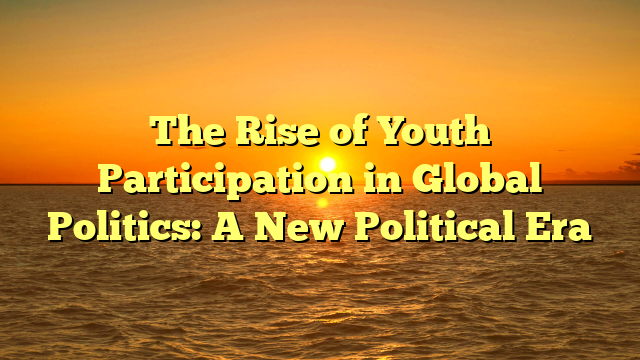In recent years, the political landscape has undergone a profound transformation driven by one key force: the youth. From climate marches in Europe to democracy movements in Asia and voter mobilization campaigns in the United States, young people are asserting their voices in ways not seen in decades. This rise in youth political engagement represents more than a fleeting trend—it may well signal the beginning of a new political era defined by activism, digital literacy, and a desire for meaningful change.
A Generation No Longer Apolitical
Traditionally, young voters have been characterized by political disengagement, often showing the lowest voter turnout rates in national elections. But this image is rapidly fading. According to a Pew Research Center study, voter turnout among Americans aged 18–29 in the 2020 U.S. presidential election rose to 50%, a significant increase from just 39% in 2016. In countries like Nigeria and India, youth-led political protests have drawn millions into the streets, demanding justice, transparency, and reform.
The shift is not just about numbers—it’s about mindset. Unlike previous generations, today’s youth have grown up in a hyperconnected world, where global crises such as climate change, income inequality, and social injustice are not abstract issues but visible, immediate threats. Social media platforms, often criticized for misinformation, have also played a pivotal role in mobilizing and educating young people on complex political topics.
From Online Advocacy to Real-World Impact
While critics argue that online activism—so-called “slacktivism”—lacks real impact, the truth is more nuanced. Hashtags like #FridaysForFuture, #BlackLivesMatter, and #EndSARS have transcended digital boundaries and led to real-world protests, legislative discussions, and shifts in public opinion. In many cases, youth-led movements have pressured governments to act, pushed institutions to reconsider policies, and inspired intergenerational dialogue.
What distinguishes modern youth activism is its decentralized, often leaderless nature. Rather than aligning with traditional political parties, many young activists prioritize issues over ideology. This can make their influence unpredictable but also powerful, as it’s rooted in authenticity and grassroots energy.
Challenges Ahead
Despite this momentum, young people still face significant barriers to political power. Many countries maintain high age requirements for holding office. In others, systemic corruption, censorship, and political repression limit the space for youth voices. Even in damritogel , young candidates often struggle to gain funding, media attention, and institutional support.
Moreover, the digital platforms that empower youth activism can also expose young activists to online harassment, surveillance, and misinformation campaigns. The challenge for the next generation will be not only to sustain their political engagement but to do so in a way that is safe, informed, and resilient.
A Force That Cannot Be Ignored
The increasing visibility and influence of young people in politics are already reshaping how policymakers approach critical issues. Climate policy, education reform, racial justice, and digital rights have all gained prominence due in part to youth advocacy. Politicians who ignore the concerns of young voters do so at their own peril, as this demographic is poised to become an even larger share of the electorate in the coming years.
Youth participation is not a silver bullet for solving complex political problems, but it injects a vital dose of energy, creativity, and urgency into democratic systems. Whether through protest, policymaking, or running for office, young people are claiming their seat at the table—and they’re not waiting for an invitation.
Conclusion
The rise of youth in politics is more than just a wave of enthusiasm; it is a durable shift with long-term implications. As global challenges become more interconnected, the need for fresh perspectives, bold leadership, and inclusive policymaking becomes ever more urgent. Young people are not only the leaders of tomorrow—they are the changemakers of today.
